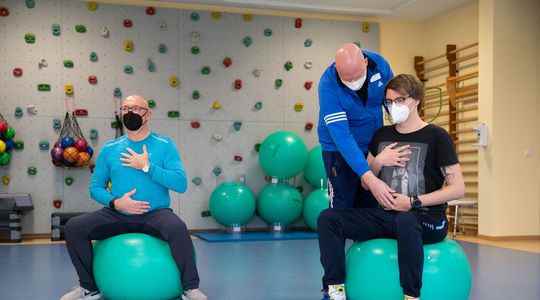Tens of thousands of suffering patients, sometimes forced into medical wandering. How to properly care for patients with Covid-long? Since the start of the epidemic, consideration of this new medical problem has improved in France, in particular thanks to the establishment of dedicated centres. But the challenge remains significant to manage to take care of the hundreds of thousands of patients suffering from chronic fatigue, brain fog or respiratory failure, and who require specific care. “There are around fifteen Covid-long care centers, whether in private clinics or hospitals, but this remains insufficient”, underlines Jérôme Larché, an infectious disease specialist who was one of the first to take an interest in Covid-long in France.
In Europe, recognition of the disease is taking hold, but the gaps in treatment remain significant. Disparities which are partly explained by the different levels of epidemic waves in European countries. “In Italy they are quite active on the subject, because they were very affected during the first waves and there is today a real mobilization for the management of the Covid-long”, explains Jérôme Larché. Thus, Italy has set up patient follow-up through day clinics. Few “post-covid clinics” have been created so far, but the subject was recommended in a report by the National Institute of Health (ISS) published in July. In addition, an envelope of 50 million euros has been released to guarantee 100% coverage until 2023 of more than 160,000 patients cured of Covid and the country is also one of the first to be interested in the long-term consequences of the virus in children.
Saturated centers
Some of our neighbors also seem to have quickly become aware of the problems that these persistent Covid cases could represent in terms of public health. In the United Kingdom, a leading country on the subject, the National Institute for Health and Care Excellence (NICE), has recognized the Covid-long syndrome since October 2020. It is defined as disease symptoms that persist after 12 weeks and cannot be explained by another diagnosis. A roadmap with care recommendations has been established and nearly a hundred centers dedicated to Covid-long have emerged in the country. In addition, an extensive funding plan of more than £100 million has been put in place, with the aim of supporting research but also improving care in “Covid-long” centres.
But given the extent of the disease, the task is difficult. According to official British statistics, nearly 1.3 million patients present symptoms of Covid-long in the country. As a result, despite a high number of dedicated centers, many do not manage to have appointments in these structures, or have to wait almost 6 months for a consultation. A situation such that in some regions, general practitioners have been asked to stop directing patients to these specialized clinics.
Extensive funding across the Atlantic
For some observers, the solution is to be found in the establishment of “Covid-long” units in hospital structures. The UDI deputy Michel Zumkeller is thus at the origin of a law inspired by the Catalan model and adopted at the end of January, which should help to better meet these needs in France. “With this text we have taken a further step, with the obligation to set up Covid-long care units in the hospital”, he judges. The aim is to allow uniform care in the territory, and the rapid identification of the disease thanks to “referents”, present in the hospital.
“It is not yet a European policy, yet it would be important to find common ground on the political will to take charge of this problem and on the procedures… We will probably get there”, hopes Jérôme Larché. Instituted nationally, the funding plans for research on this subject may appear to be much lower than the means allocated to Covid-long across the Atlantic. In the United States, a research plan endowed with 1.4 billion euros was launched in February, it must be spread over four years. For more than a year, Covid-long centers have emerged in the country, there would now be at least one per state. An absolute necessity when an article published in August 2021 in the New England Journal of Medicine estimated that at least 15 million people in the United States could suffer from Covid-long by the end of the pandemic. A figure probably below the reality caused by the new contaminations linked to Omicron.
